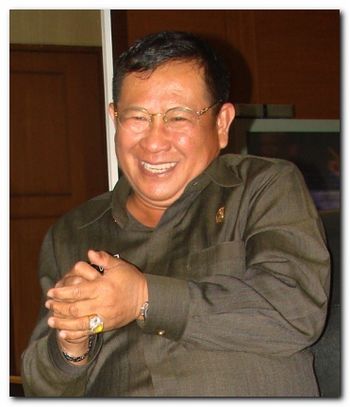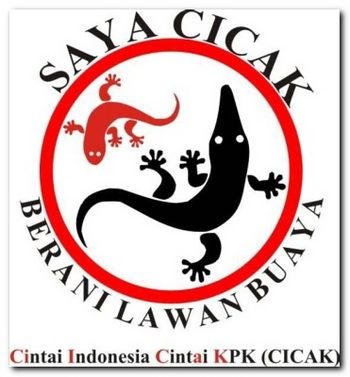David Jansen
The public has rallied under the symbol of the cicak and the buayain support of the KPKImage courtesy of Gunadarma and Associates |
Under other circumstances, 2009 would have been a positive year for Indonesia’s National Police (Polri). A newly appointed chief of police rolled out a fresh reform program called ‘Quick Wins’ with the intention of showing the Indonesian community that its national police was indeed changing. Polri succeeded in exterminating an old enemy, Noordin M. Top and, as an added bonus, unravelled most of his terror network in a spectacular series of well-publicised raids. It also successfully managed the security side of the 2009 national election. But in the end 2009 turned out to be a rough year for Polri, full of humiliation, defeat and exposure. Two simple words explain this ironic situation: Bank Century.
The ins and outs of the Bank Century case deserve a whole book, though perhaps a telenovella would be more appropriate. The episode began in October 2008, when Bank Century experienced a crisis of liquidity and some of its larger customers, including the wealthy Indonesian cigarette magnate, Budi Sampoerna, began withdrawing their investments. Century panicked and blocked them from withdrawing funds. The reason was simple: the bank was on the brink of bankruptcy and could not afford large-scale withdrawals.
In November 2008, Indonesian monetary authorities stepped in and began shovelling cash into the bank in an attempt to keep it afloat. The rest, as one might say, is history. What is important to this story though, is how this case became the catalyst for a war between the police and the KPK, Indonesia’s elite anti-corruption agency.
Exposed by a wire-tap
So what, we may ask, does that have to do with Polri? Nothing really. Except that around April 2009, Polri’s chief of detectives, Commissioner General Susno Duadji, tried to help Budi Sampoerna take back his frozen savings. This intervention was at the very least tantamount to misconduct. Even so, Susno might have been able to escape with a slap on the wrist if no further information had emerged. Instead, he became ensnared in a KPK investigation into Bank Century.
Using its notoriously effective wiretaps, the KPK obtained explosive recordings of Susno reportedly soliciting a Rp.10 billion bribe from a lawyer representing Budi. The bribe was allegedly a quid pro quo payment for helping to retrieve the tycoon’s money. It appears that word of these wiretaps reached the ears of Police Chief Bambang Hendarso Danuri, who duly warned off his subordinate. The attempted bribe was aborted and Susno was temporarily saved. No formal charges have yet been laid over this alleged case of bribery but the fact that the KPK had the gall to bug a senior police officer was, for Polri, an act of provocation that placed it and the KPK on a path to open conflict.
Polri was the first to land a blow
In this struggle, Polri was the first to land a blow. Unexpectedly, the KPK’s imprisoned former director Antasari Azhar was the one to offer Polri the opportunity. In May 2009, Polri had charged Antasari with masterminding the assassination of Nasrudin Zulkarnaen, the husband of his alleged love interest. Some say the police coached witnesses to falsely accuse the former KPK chief. Whatever the truth of these accusations, Antasari was found guilty of the murder in February 2010. His lawyers are now appealing the verdict.
Antasari gave Polri the means to crack down on the KPK in July 2009 when he twice made formal complaints of corruption against two of his deputies, Chandra M. Hamzah and Bibit S. Rianto. Antasari alleged that Chandra and Bibit received bribes from an entrepreneur named Anggoro Widjojo, the owner of PT Masaro Radiokom. Radiokom had at one time been the primary supplier of telecommunication equipment to a number of Indonesian security agencies. Susno had met Anggoro in Singapore, where the entrepreneur was hiding from a KPK investigation into allegations that he had made bribes to obtain the contracts.
Polri used every tool in its arsenal to bring down Chandra and Bibit. It even detained them for a period on the excuse they could prejudice the police case by holding news conferences. In public eyes this move was perceived as an abuse of power. One thing which made this whole situation inextricably worse was Polri’s perceived arrogance. Perhaps unfairly these perceptions were in part a result of the conduct of Susno, who showed his true self in an unwise interview with Tempo magazine in July 2009. In this interview Susno portrayed the developing conflict between the KPK and Polri as like a struggle between a gecko (cicak) and a crocodile (buaya). This unbelievably foolish simile was taken up in the public arena, where it was used to depict the KPK as an underdog. Subsequent demonstrations, online forums and other pro-KPK groups flocked under the banner of the cicak.
 |
Susno Duadji, the police commissioner implicated in the Bank CenturycaseImage courtesy of Nurlis Meuko and VivaNews |
In the end what saved Bibit and Chandra was not Polri’s mistakes, but the release of the KPK’s own wiretaps, in the form of hours of recorded phone conversations involving Anggoro’s brother Anggodo, who was Polri’s star witness. Anggodo had previously testified to acting as a middleman for his brother’s alleged bribery attempt. The taped conversations, however, suggested that Anggodo was conspiring with senior officials to frame the KPK. A wave of public outrage forced the president to establish a special commission of inquiry in November 2009. This inquiry, dubbed ‘Team 8,’ made a series of findings that roundly condemned the investigation of Bibit and Chandra.
The Team 8 inquiry put the president between a rock and a hard place. One the one hand Yudhoyono had no desire – nor did Indonesian law give him the authority – to intervene in a criminal investigation, however partisan and poorly constructed the case may be. On the other hand, rolling demonstrations and public hostility towards the police meant that action was necessary. So on 23 November 2009, Yudhoyono addressed the nation with great reluctance. In a speech peppered with jargon and much obfuscation, he said that it was best for Polri and the Attorney General’s office to dump the case, but that he was unable to order this.
Nevertheless, the president’s speech did the trick. Such a public dressing down from the head of state left Polri and the Attorney General’s office in an untenable position. In the end, the state prosecutors blinked first, deciding not to proceed with the case. Having been publicly vindicated in this most dramatic of ways, Bibit and Chandra were formally cleared of all charges on 1 December 2009.
Struggling for control
What conclusions can be drawn from this amazing set of events? It is often said the true character of a person emerges in a crisis. Perhaps the same is true of an organisation. Polri displayed the worst of characteristics in its stoush with the KPK: corruption, abuse of power, paranoia, reckless disrespect for natural justice, the list goes on. It would have been impossible to script a more damning exposition.
It is tempting to say that this debacle occurred because of corruption. The problem began, after all, with money. In reality, though, Polri’s war with the KPK was much more about control. At issue was the danger of an agency outside the police threatening police officers with prosecution. Two things made this especially hard for a police force to swallow. First, Polri as an institution is a fierce defender of the state’s monopoly over criminal law – a monopoly that, incidentally, happens to fall under police control. In the world of the police, there should be no guards to guard the guardians. Second, all police forces are held together by a culture of solidarity. Police officers protect their own. Given the dangerous environment police operate in, this characteristic can often be quite positive. But when police forces are faced by outside threats – such as an investigation into police wrongdoing – this culture can drive them into destructive attempts to protect members of their own fraternity.
The KPK scandal will have lasting consequences
For a brief period in October-November 2009, when society turned decisively against it, there was a small but real possibility that a thorough clean-up of Polri was on the cards. Ultimately, however, the police survived the year intact. As is so often the case, Polri offered up a scapegoat. Police headquarters removed Susno Duadji from command in November 2009 and quietly allowed parliament’s own investigations into the bailout of Bank Century to roll along. While the media descended into a frenzy over the parliamentary inquiry, Polri exited stage left.
Polri may for the moment breathe a sigh of relief. But the KPK scandal will have lasting consequences. Never great, Polri’s reputation has now nose-dived, damaging perceptions of all the good work done in years of incremental reforms. In addition, the incident has actually created new enemies for the police. Among them is President Yudhoyono’s Taskforce for the Eradication of the Legal Mafia. Time will tell whether this team lives up to its title, but as a unit with the blessing of the president to root out corruption in the legal system, its existence is a threat to Polri. The other big lesson of 2009 is that the KPK is here to stay. In 2009 Polri failed in its attempts to bully the KPK into submission. But the bad blood generated by this clash means further KPK investigations into the activities of police officers are all the more likely in future.
David Jansen (david.jansen@anu.edu.au) is a PhD candidate at the Australian National University. He is writing his dissertation about policing in Indonesia.
